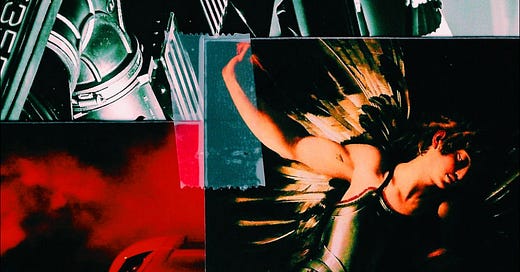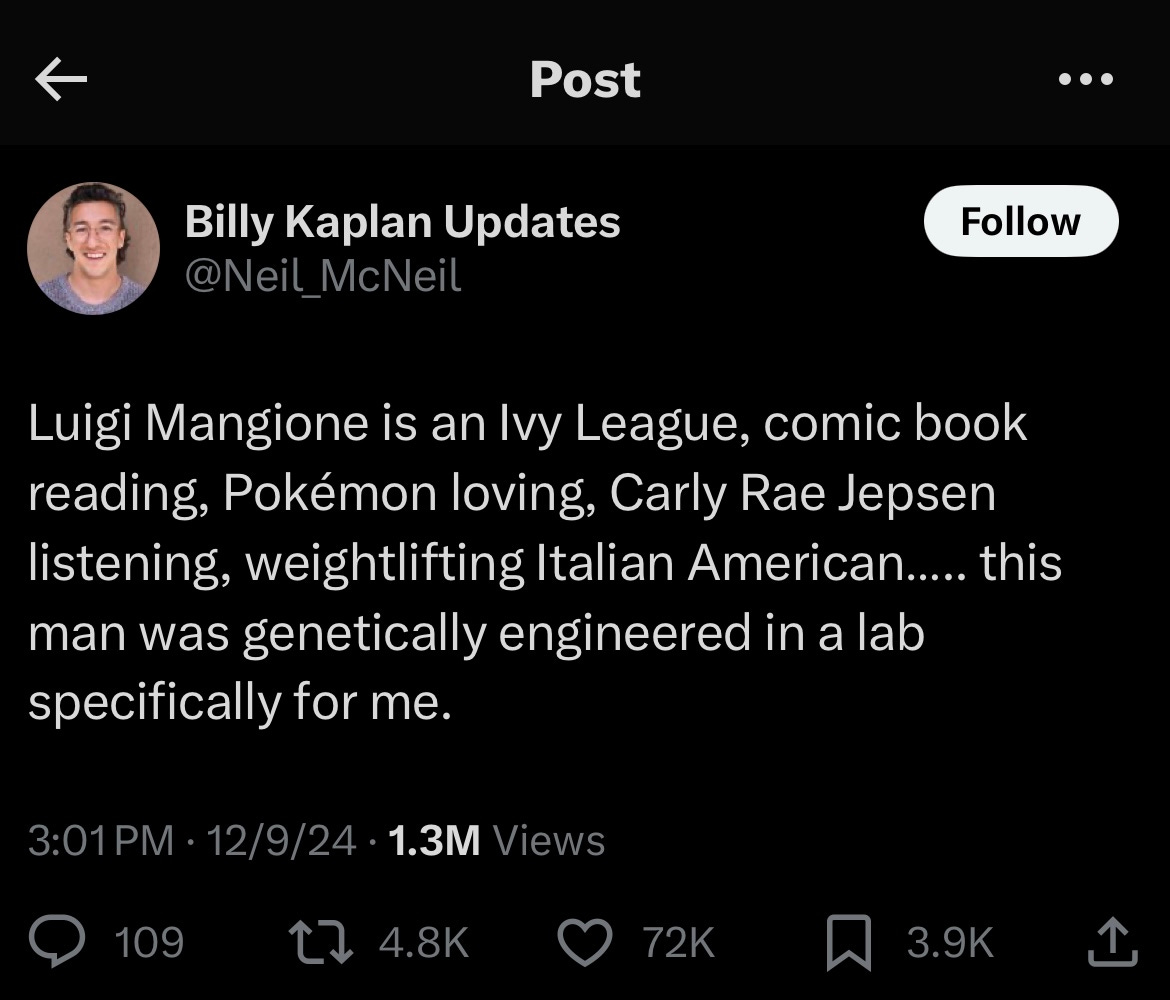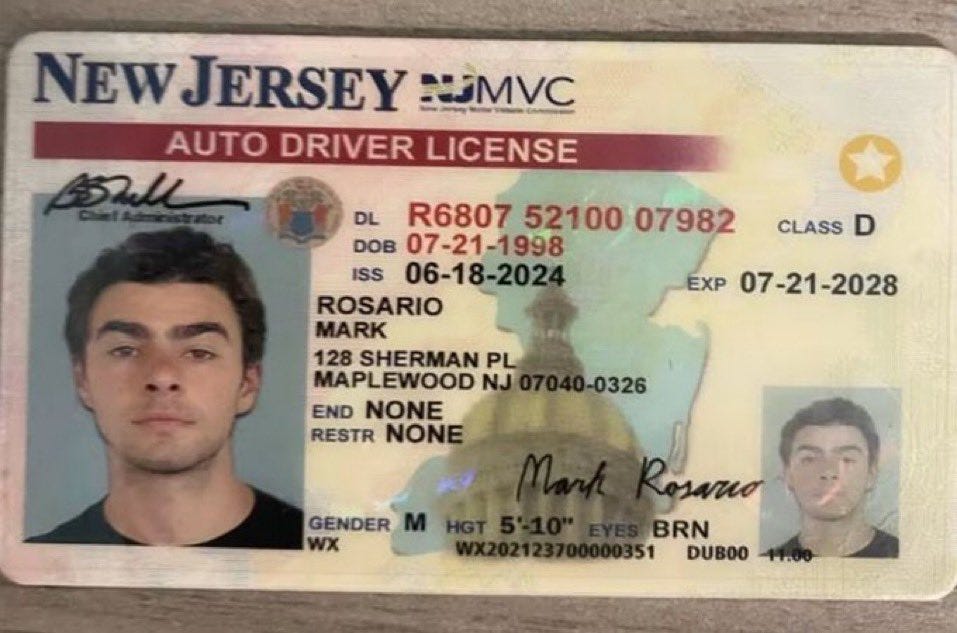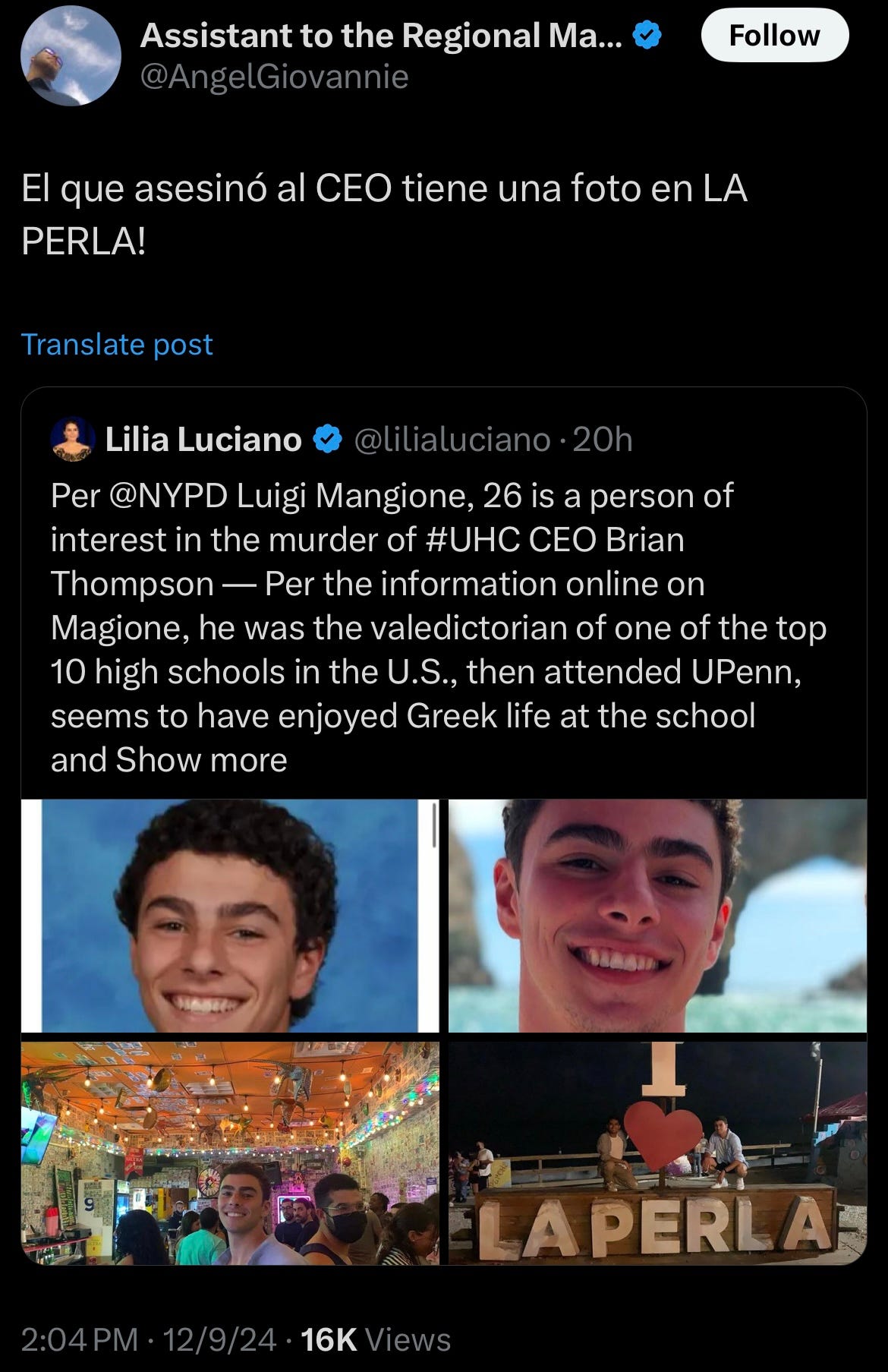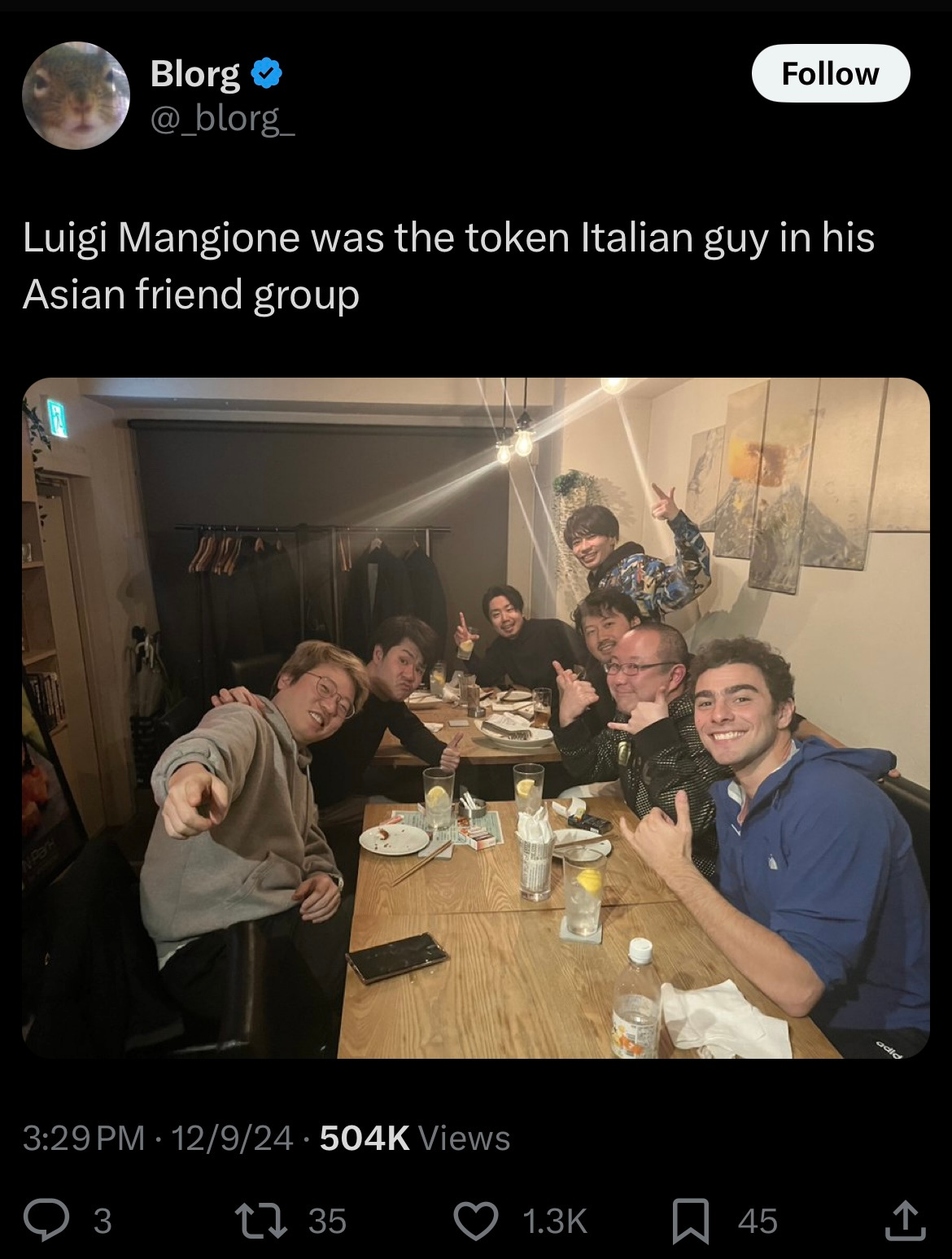Luigi Mangione: Beautiful [Italian] Boy as Destroyer
the allure of sexual/ethno-fluidity (memes included)
Why, you may wonder, has the internet become obsessed with a murderer? How can one possibly make light of something so heinous?
Perhaps it’s because gen-z is too irony-pilled to take anything seriously…and to restrain themselves from turning every single event or person into a meme. Or it could be that some genuinely think that shooting the executive of an HMO that perpetuates a dehumanizing corporate healthcare system is a heroic deed. Or maybe everyone’s just really thirsty…
But as always, Cracks in PoMo is going to put forward a different, more outlandish take (because what else would you expect from us):
The internet is obsessed with Luigi Mangione because his sexual and ethnic identities—or “personae”—are emblematic of a type of fluidity that has largely become taboo in our era plagued by puritanical speech codes and the imperative to slap a label onto everything.
Ever since the still from a store security camera of the hooded young man flashing the cashier a smile was released, the internet has been flooded with memes joking about the attractiveness of the alleged shooter. Upon the discovery of his identity and the surfacing of more images—especially shirtless ones, all hell seems to have broken loose: from the thirst posts, to those offering to come to his defense or to let him “serve his sentence in [their] house,” to the United Shooter lookalike contest in Washington Square Park.
Certainly, the internet’s fixation on Luigi Mangione has something to do with the fact that the guy is good-looking. Of course, there’s something perplexing about the paradox of an attractive person committing a crime—needless to say, people would not be as interested if he were ugly (or mid). But it’s more than just his physical appearance that allures us.
What’s got the internet’s panties in a bunch is not the proportions of his facial features or his athletic build, but rather, the fact that he’s attractive and he knows it.
In a chapter on The Picture of Dorian Gray and Oscar Wilde’s downfall, Camille Paglia insists that Wilde’s attraction to young beautiful men had more to do with their personality than their physical appearance.
Dorian’s personality […] is conveyed by entirely physical, visual means. This is a representational law of pagan sexual personae. Wilde calls Basil’s painting a “portrait of a young man of extraordinary personal beauty.” Personal: what other kind of human beauty could there be? This homoerotic locution means Dorian has beauty of personality, but not personality as normally understood. At his first trial, Wilde sparred with his cross-examiner, who read aloud from Basil’s confession to Dorian:
Edward Carson: Do you mean to say that that passage describes the natural feeling of one man towards another?
Wilde: It would be the influence produced by a beautiful personality.
Carson: A beautiful person?
Wilde: I said “a beautiful personality.” You can describe it as you like. Dorian Gray’s was a most remarkable personality.
For Wilde, “personality” is a state of being, a disposition of the soul—distinct from both one’s psychological temperament and moral character. Someone like Dorian Gray’s physical beauty is an outward manifestation of his beautiful personality.
“No word,” continues Paglia, “appears more often in Dorian Gray than ‘fascinating.’…An unanswered question of history is how one individual can control masses of people.” Dorian exercises a capacity for captivating people—both male and female, regardless of “sexual orientation”—and for making them obsessed with him.
Per usual, Paglia turns to Freud, who believed there was a correlation between narcissism and the capacity to fascinate: “narcissism has ‘a great attraction’ for others because of that ‘self-sufficiency and inaccessibility’ shared by children and cats.” Similarly, “narcissistic politicians induce the investment of mass emotion by a process of fascination.” It was the fact that Mangione is so aware of his attractiveness—to the point that he couldn’t resist flirting with someone at the least opportune moment—that fascinates us so.
Speculation has abounded over Mangione’s potential bi-curiosity and his combination of masc and femme interests/attributes.
His fluid sexuality is far from inconsequential. “Charisma,” Paglia continues,” is the numinous aura around a narcissistic personality…the radiance produced by the interaction of male and female elements in a gifted personality. The charismatic woman has a masculine force and severity. The charismatic man has an entrancing female beauty. Both are hot and cold, glowing with presexual self-love.”
The narcissistic beautiful boy is amoral, feeling himself to be “above the law.” While the good are “ruled by abstract systems, ethical and social,” the “not-good” like Dorian Gray are “ruled by personality alone.” Thus his sexual fluidity is a manifestation of his refusal to be confined by the laws of social norms, the State, Nature, or even God. The lawless decadent dandy gets a thrill from breaking rules for its own sake. Just as Saint Augustine stole the pear not out of hunger for the fruit but for the hunger for the forbidden, the bicurious dandy enjoys transgressing the design of nature not because of his actual attraction to the same sex, but rather to transgression of the act itself.
“Dorian is a natural hierarch who dominates by his ‘fascinating’ beauty, drawing both sexes toward him and paralyzing the moral will….Like the star of film or popular music, Dorian draws heterosexuals into bisexual responses.”1 His sexual ambiguity puts a spell on those who cross his path, making many people feel like Squidward.
But the tricky thing about the cult of Adonis—the archetypal beautiful boy of pagan antiquity—is that it is anything but glamorous. It is not natural for youth to remain in tact for the long-run, nor is it natural for a man to aspire to be aesthetically beautiful (and to retain a youthfully post-pubescent, androgynous appearance). Thus, even if Mangione isn’t actually bi-curious, there is something incontrovertibly gay about him.
Because it is unnatural—biologically, socially, and ontologically, the cult of youthful male beauty tends toward destruction—both for the object of worship and his worshippers. “The narcissism of this beautiful boy has disastrous consequences: suicide, murder, vice. Dorian excites a mesmeric followership among his well-born companions, but one directed toward no public aim, not even tyranny.” One must sell their soul—their morals and values—in order to keep up their battle against nature.
Unlike the holy Saint Sebastian who, rather than attempting to hold onto his youth and possess beauty, made an offering of his life to God—allowing himself to be penetrated and possessed by He who is eternal Truth and Beauty—the false god Adonis eventually met his demise—being penetrated by the horn of a devilish boar and dying—his youthful beauty fading into the abyss of eternity. Dorian (and Wilde) met similar fates, leaving countless people ravaged in their wake.
Of course, Wilde is not the only one to have been ensnared and destroyed by the allure of the beautiful boy. Famed inverts like Hadrian, Michelangelo, Caravaggio, Verlaine, Gide, James Baldwin, and cougars like Ayn Rand, Demi Moore, Mariah, Madonna suffered from this weakness. Few have been able to do like Socrates who resisted the tempting allure of Alcibiades in the name of obeying the promptings of reason (Father John Gray—on whom the character of Dorian is based—nearly yielded to the temptation, but quickly changed course upon realizing the consequences of such a path).
Dorian “creates a seditious heterocosm within society, a colony of pagan idolatry.” His own lawlessness incites a lawlessness in this who fall victim to his charm. “Seduction literally means leading astray.’…Dorian daemonizes his followers, deconstructing the social order…Wilde says of one of Dorian’s ill-fated admirers, ‘To him, as to many others, Dorian Gray was the type of everything that is wonderful and fascinating in life.’ Extreme male beauty, like a siren song, lures toward destruction.”
Luigi Mangione’s Wildean Sexual Persona allows us to break restrictive taboos and social conventions: The cult that has cropped up around him in the last 24 hours has allowed people to indulge in sadistic fantasies, as well as to embrace a form of sexual fluidity that defies the current label-happy paradigm. Perhaps a lesser—yet still alluring—feature of his “personality” is his Italian heritage. The Luigi Mangione craze has also given us license to break taboos surrounding discourse about ethnic identity.
His name alone incites laughter, as it evokes gross caricatures of Italian culture as does Super Mario Bros.
It’s ok. Italians count as white (now, at least). So jokes about ethnic stereotypes are fair game. As a (half-)Italian, I’m not in the least bit offended. I have a sense of humor, and recognize that most of these jokes (but not all) are being made in jest. As we all know, jokes made purely in jest about certain ethnic stereotypes can get you in a lot of trouble…thus the joy and revelry some are finding in finally being able to crack jokes about ethnic stereotypes without risking their lives getting destroyed.
But it’s not just the fun of making Italian jokes—it’s that Mangione has allowed us to go against the current racial paradigm that reduces people to black and white [and Asian and Hispanic], to oppressed and oppressor, and to embrace the fact that ethnicity is much more complex—even fluid—than most DEI programs will tell us.
Surely, Mangione has benefitted from white privilege in a purely material sense. I’m sure that prior to having murdered someone, he hasn’t had to worry about getting profiled by the police. But beyond this criterion, Mangione is far from “white”—he is clearly not an Anglo-Saxon—and we all know it. If he were just a simple WASP, we would not be fascinated by him. There’s nothing exotic about an Anglo murderer…rather, they are more likely to be seen as sad and creepy rather than alluring…confirming that spicy whiteness is more than just a meme—it is an ontological fact (for that matter, why else would Oscar Wilde travel all the way from England to Italy to have orgies with young dudes??).
Further, the jokes about his Latinidad (and Asian-ness) have confirmed what people had understood for many years—before white flight and assimilation en masse: that ethnics are distinct from Anglos…and that culturally speaking, “Latins” have much in common with each other.
 Tiktok failed to load.
Tiktok failed to load.Enable 3rd party cookies or use another browser
I often joke about the so-called World Wide Latina Belt, joining those who have argued that Italy is indeed a part of it. This rather racist, former Trump adviser seems to agree (more on Ari’s spicy white appeal here).
Lastly, the celebration of his ethnofluidity has validated those who have argued that ethnicity is just as self-determined—and fluid—as gender, vindicating the Dolezals of the world.
In all seriousness, murder is really bad. As is lust. This hot take is purely aesthetic and for the sake of provoking some thought. For a real moral take, I suggest you check out Hamilton Craig’s recent piece in COMPACT:
If Brian Thompson had remembered his own death, would he have conducted his business differently? The medieval ideal of noblesse oblige, surely more often espoused than practiced, has vanished along with the knowledge that Lord and Peasant are bound for a common end. In looking at this story of death, I find myself unable to resist the old, hackneyed conservative idea that Justice and Virtue are inseparable.
We cannot murder our way to a society in which life will be respected. Respect for life must begin with respect for death, which is the essence of religion. In a society that was religious in this sense, neither Thompson nor his murderer, and certainly not the cackling hordes of online celebrants, could exist.
Ultimately, I hope we don’t have to wait around for another person to be murdered for the internet to experience such a rapturous sense of revelry and unity again.
Mr. Hubbard, the “celebrated frame-maker,” comes instantly at his bidding: “As a rule, he never left his shop. He waited for people to come to him. But he always made an exception in favour of Dorian Gray. There was something about Dorian that charmed everybody. It was a pleasure even to see him.” The young shop assistant reacts similarly: “[He] glanced back at Dorian with a look of shy wonder in his rough, uncomely face. He had never seen anyone so marvellous.”…Depressed, he wanders into Covent Garden: “A white-smocked carter offered him some cherries. He thanked him, and wondered why he refused to accept any money for them, and began to eat them listlessly.” The man makes a mute pagan offering to Dorian’s remarkable beauty, stirred by an emotion he could not explain.

